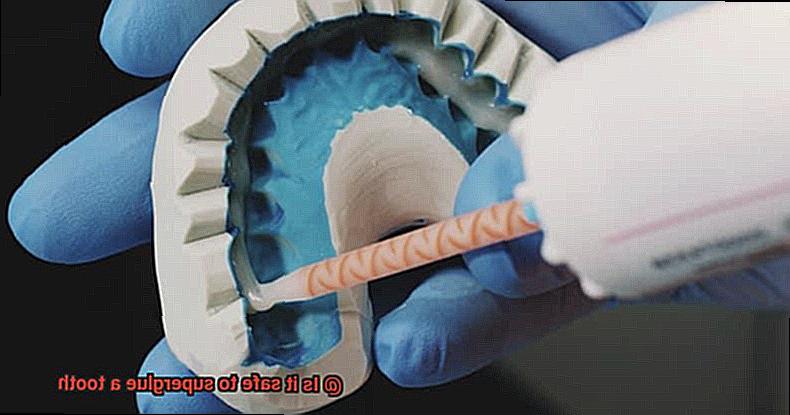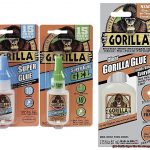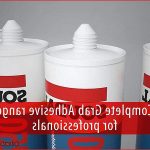Ever been in a dental dilemma, desperately seeking a quick fix for a broken tooth? Well, you’re definitely not alone in that frantic search for a solution.
The idea of using superglue to patch up a wayward tooth may have crossed your mind. But before you reach for that trusty tube, let’s take a deep dive into the world of dental restoration to uncover the truth about its safety.
So strap yourself in and prepare to unearth some surprising facts about superglue and its compatibility with our precious pearly whites.
Reasons Why Superglue Should Not Be Used on Teeth
Contents
- 1 Reasons Why Superglue Should Not Be Used on Teeth
- 2 The Dangers of Using Superglue on a Tooth
- 3 How to Safely Treat a Loose or Broken Tooth
- 4 The Benefits of Visiting a Dentist for Professional Treatment
- 5 Possible Complications from Using Superglue on Teeth
- 6 How to Preserve a Knocked-Out Tooth
- 7 What to Expect During a Dental Appointment
- 8 Tips for Preventing Damage to Teeth
- 9 Conclusion
It’s understandable to want a quick fix, but before you reach for that tube of superglue, it’s important to understand the potential dangers and why it should never be used on teeth. In this blog post, we’ll explore the reasons why superglue is a big no-no when it comes to dental issues.
Designed for Everything But Teeth:
Superglue is a versatile adhesive, but it was never meant to be used in the mouth. Dental procedures require specialized materials and techniques to ensure safety and effectiveness. From bonding restorations to repairing chipped teeth, dentists have the knowledge and tools necessary for proper treatment.
Superglue contains chemicals that can be toxic if ingested or come into contact with sensitive oral tissues. The adhesive may contain cyanoacrylate, which can release harmful vapors and cause irritation or damage to the gums, tongue, or other soft tissues in the mouth. Additionally, if accidentally swallowed, superglue can lead to gastrointestinal issues. It’s simply not worth the risk.
Stubborn Removal:
Superglue forms an incredibly strong bond between surfaces, which is great for fixing household items but not so great for teeth. Once applied, it becomes incredibly difficult to remove without potentially damaging the tooth enamel. Imagine scraping away at your precious enamel just to remove a layer of superglue: definitely not a situation you want to find yourself in.
Delaying Proper Treatment:
Using superglue on a broken tooth may provide temporary relief or stability, but it doesn’t address the underlying issue causing the damage. By relying on superglue, you’re essentially delaying proper dental care. Dentists have the expertise to diagnose and treat dental problems effectively, so it’s essential to seek professional help instead of resorting to quick fixes.
Increased Risk of Infection:
When a tooth is damaged, there’s an increased risk of infection. Applying superglue to a damaged tooth creates a barrier that can trap bacteria and food particles, leading to decay or gum disease. This can have serious consequences for your overall oral health. Seeking professional dental care ensures that any underlying infections are properly addressed.
Conclusion:
In the world of dental care, superglue has no place. From its lack of approval for dental use to the potential toxicity and difficulty in removal, using superglue on teeth can lead to serious health risks and complications. Remember, your oral health is too important to gamble with quick fixes. Always prioritize professional dental care and leave the superglue for fixing other non-dental items.
By understanding the reasons why superglue should not be used on teeth, you can make informed decisions about your dental health. Trust in the expertise of dentists and seek their professional care for any dental issues or concerns.
The Dangers of Using Superglue on a Tooth
We’ve all been in situations where a broken or loose tooth can cause discomfort and inconvenience. In these moments, the thought of using superglue to fix the problem may seem like a viable solution. However, before you reach for that tube of adhesive, it’s crucial to understand the potential risks and dangers associated with using superglue on a tooth.
Potential Health Risks:
Superglue is not designed for oral use and can have harmful effects on your health. The toxic nature of superglue can cause severe irritation and damage to the delicate tissues in your mouth. Inhalation or ingestion of superglue can lead to serious complications such as throat and esophageal blockages, chemical burns, and even poisoning. Remember, when it comes to your oral health, it’s always best to leave it in the hands of professionals.
Cosmetic Risks:
Using superglue as a temporary fix for a broken tooth may seem like an appealing option, especially for cosmetic reasons. However, this approach can have long-term consequences. Superglue is not intended for dental repair and can interfere with future treatment options. If a dentist needs to repair or extract the tooth, the presence of superglue can complicate the procedure and potentially harm surrounding tissues. Furthermore, superglue lacks the ability to mimic the natural color and texture of teeth, resulting in an unnatural appearance that may draw attention and further embarrass the individual.
Temporary Solution, Long-Term Problems:
While using superglue may provide temporary relief by holding a broken tooth together, it fails to address the underlying issue. Dental problems require professional attention, as relying on superglue can lead to further damage over time. The adhesive properties of superglue can create excess pressure on the tooth, causing additional cracks or fractures. Moreover, using superglue can mask symptoms of more severe dental issues, delaying proper diagnosis and treatment. Ignoring these problems can lead to further complications, such as infection, abscesses, and even tooth loss.
Seek Professional Dental Care:
Instead of resorting to DIY fixes with superglue, it is essential to seek professional dental care for any dental concerns. Dentists have the expertise and knowledge to diagnose and treat your dental problems effectively. By addressing the root cause of the issue, you can ensure long-term oral health and prevent further complications. Dentists have access to safe and appropriate materials to repair broken teeth, such as dental bonding or crowns, which are specifically designed for oral use and provide durable and aesthetically pleasing results.
How to Safely Treat a Loose or Broken Tooth
Don’t worry, we’re here to help. Today, we’ll discuss how to safely treat a loose or broken tooth. But remember, don’t reach for the glue. Let’s find out why seeking professional dental care is essential.
The Importance of Professional Help:
When it comes to your teeth, it’s best to leave it to the experts. Dentists have the knowledge and tools required to treat your tooth properly. Attempting to fix it yourself can worsen the situation and even lead to permanent damage.
Handling a Loose or Broken Tooth:
If your tooth is still in your mouth but wiggly, handle it with care. Avoid biting down on hard objects and notify an adult immediately so they can help you seek professional care. If your tooth has fallen out, it’s crucial to handle it gently. Hold it by the top part (crown) and keep it moist by placing it in milk or saliva until you see a dentist.
Temporary Solutions:
While waiting for your dentist appointment, temporary options can provide some relief. Over-the-counter dental cement or temporary filling material can help stabilize your loose tooth until you receive professional dental care. You can easily find these products at drugstores.
Managing Pain and Discomfort:
A loose or broken tooth may cause pain or discomfort, but there are ways to manage it. Over-the-counter pain relievers like ibuprofen or acetaminophen can help alleviate the discomfort. However, avoid applying aspirin directly to your tooth, as this can cause burns in your mouth.
Seeking Professional Dental Care:
Remember, seeking professional dental care is crucial for proper treatment. Your dentist will know the best course of action for your tooth and can prevent any complications. In case of an emergency, locate an emergency dentist or an urgent care dental clinic near you and call ahead to schedule an appointment.
The Benefits of Visiting a Dentist for Professional Treatment
In this article, we will discuss the numerous benefits of visiting a dentist for professional treatment.
Accurate Diagnosis:
- Dentists have the necessary training and experience to accurately assess and diagnose dental issues.
- They can identify underlying problems that may be causing tooth pain or discomfort.
- By targeting the root cause of the problem, dentists provide the right treatment instead of just addressing symptoms.
Wide Range of Treatment Options:
- Dentists offer a variety of treatment options tailored to individual needs.
- From simple fillings to crowns and root canals, dentists have the expertise to perform these procedures effectively.
- DIY solutions may provide temporary relief but professional dental treatments are more long-lasting and durable.
Specialized Tools and Equipment:
- Dentists use specialized tools and equipment not readily available to the general public.
- These tools allow for safe and effective treatment, reducing the risk of further damage or infection.
- DIY solutions can be risky and may lead to complications or additional dental problems.
Proper Aftercare and Follow-up:
- Dentists provide proper aftercare instructions to ensure treated teeth heal correctly.
- Regular follow-up appointments allow dentists to monitor progress and address any concerns.
- This helps prevent complications and ensures optimal healing.
Preventative Care:
- Regular visits to the dentist for professional treatment can prevent more serious dental problems in the future.
- Dentists can identify early signs of decay, gum disease, or oral cancer, allowing for timely intervention and prevention of further damage.
Oral Hygiene Advice:
- Dentists are valuable sources of advice on proper oral hygiene practices.
- They can guide patients on brushing techniques, flossing, and preventive measures for overall dental health.
- Following their advice can prevent future dental issues and maintain a bright and healthy smile.
Possible Complications from Using Superglue on Teeth
In moments of dental emergencies, one might be tempted to reach for a tube of superglue as a quick fix for a chipped or broken tooth. However, it is crucial to understand the potential risks and complications associated with this practice before attempting such a solution.
This article aims to explore the possible complications from using superglue on teeth, shedding light on the dangers and urging individuals to seek professional dental care instead.
Damage to Tooth Enamel:
Superglue contains chemicals that can erode the protective enamel layer of teeth. This erosion weakens the tooth, making it more susceptible to cavities and other dental problems. Applying superglue to damaged enamel exacerbates the issue, leading to further deterioration of oral health.
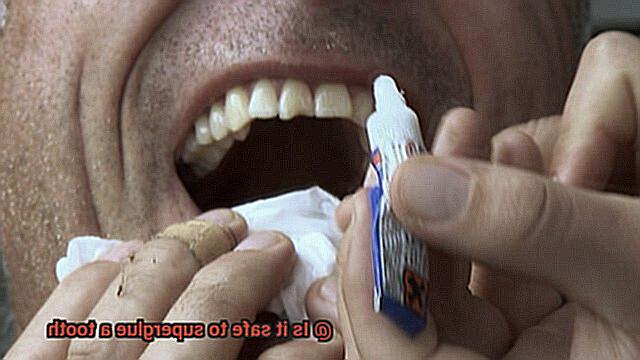
Allergic Reactions:
Some individuals may be allergic to the chemicals found in superglue. Applying it to teeth can trigger severe allergic reactions, including swelling, redness, itching, and difficulty breathing. These reactions can escalate quickly and even become life-threatening, emphasizing the need for professional dental care.
Interference with Dental Treatments:
Using superglue on a tooth can complicate future dental procedures. Dentists rely on clean surfaces to effectively perform treatments like fillings or crowns. The presence of superglue hinders their ability to properly clean and prepare the tooth, potentially resulting in an ineffective or failed procedure.
Fragile Fixation:
Superglue is not designed to withstand the forces exerted during biting and chewing. Therefore, using it as a temporary fix for a broken or chipped tooth may not provide a long-lasting solution. The glued tooth may break easily again or become dislodged while enjoying favorite foods.
Tissue Damage:
Accidental contact between superglue and gums or other soft tissues inside the mouth can cause irritation, inflammation, and even chemical burns. These complications can lead to discomfort and further oral health issues if not promptly addressed by a dental professional.
Difficulty in Removal:
Attempting to remove superglue from teeth at home using improper tools or techniques can result in further damage to the tooth or surrounding tissues. It is crucial to consult a dental professional to safely remove the adhesive without causing additional harm.
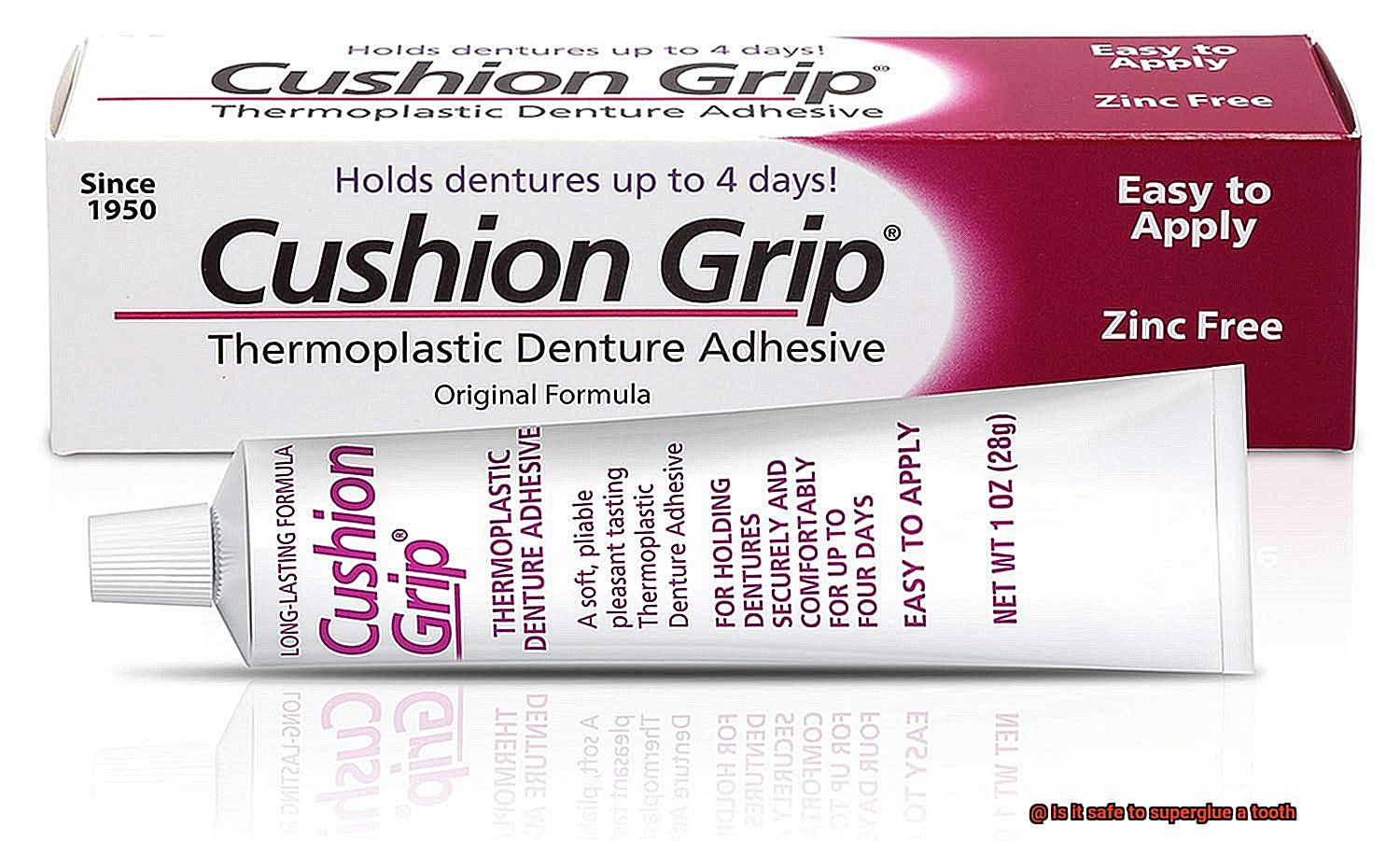
How to Preserve a Knocked-Out Tooth
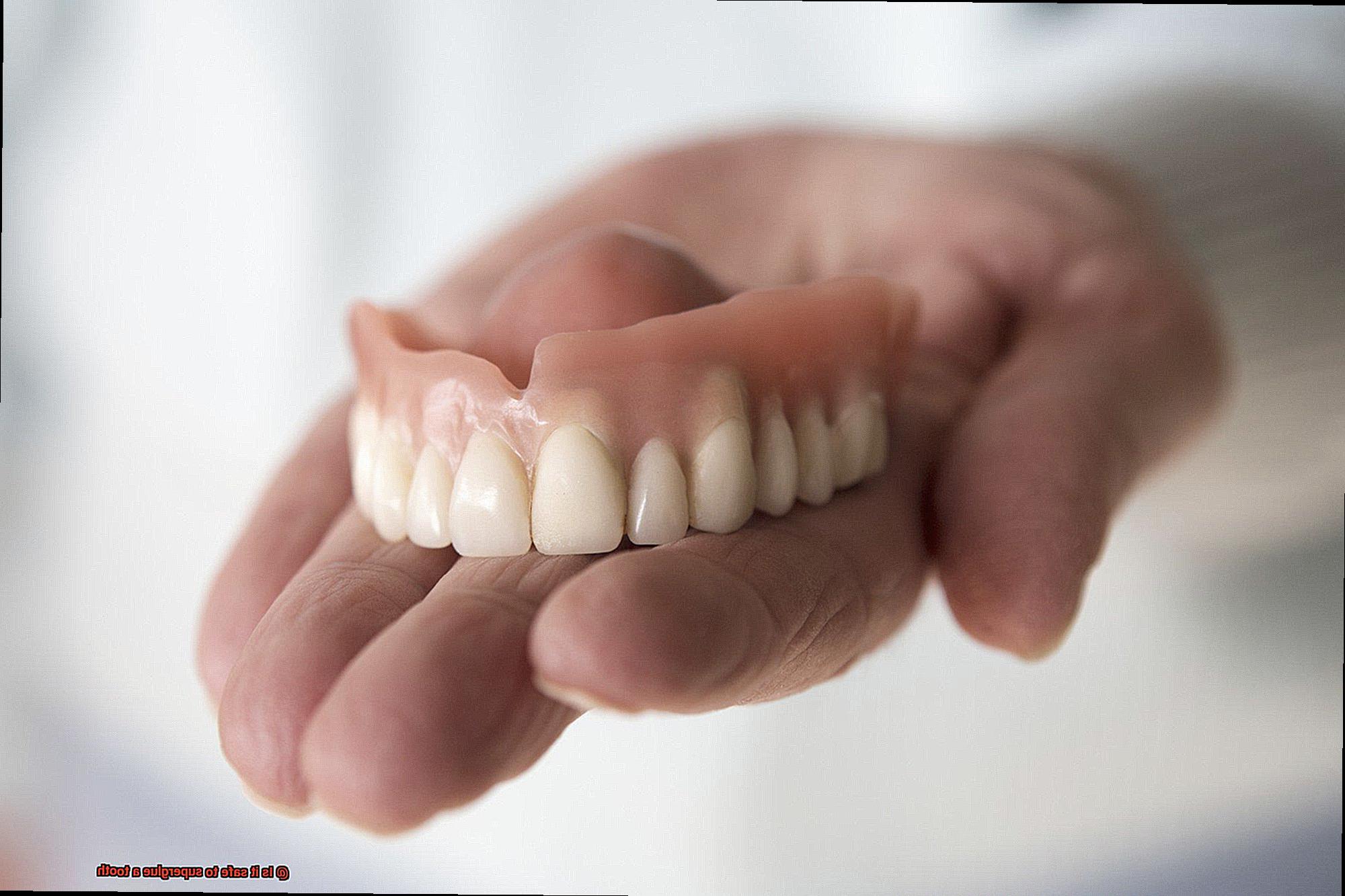
When a tooth gets knocked out, it’s important to know the right steps to preserve it. Taking swift action can increase the chances of successful reattachment. In this article, we’ll explore how to handle a knocked-out tooth with care and keep it moist until you can see a dentist. Time is of the essence, so let’s dive in and save that precious tooth.
Step 1: Handle with Care
When a tooth is knocked out, treat it delicately. Gently touch only the crown, the part you use for chewing, and avoid the root. These tiny cells on the root are crucial for reattachment. Let’s not harm our little tooth hero.
Step 2: Keep It Moist
A dry tooth is a dying tooth, so keeping it moist is vital. If possible, put the tooth back into its socket and gently push it in with clean fingers or bite down on a clean cloth or gauze to hold it in place. If reinsertion isn’t possible, we need to find our tooth friend a suitable home.
Step 3: Tooth Preservation Kits
Tooth preservation kits are superheroes designed specifically for preserving knocked-out teeth. These kits come with a solution that keeps the tooth moist and boosts the chances of successful reattachment. You can grab one from dental offices, pharmacies, or even online. Don’t worry; help is on the way.
Step 4: Suitable Mediums
No tooth preservation kit? No problem. We’ve got other options in our arsenal. Milk, saliva, or saline solution are our trusty allies here. They keep the root surface moist, giving our tooth warrior a better chance at reattachment. Just remember: no water. Water doesn’t have their back; it can damage the root surface. Stay hydrated, little tooth.
Step 5: Seek Immediate Dental Care
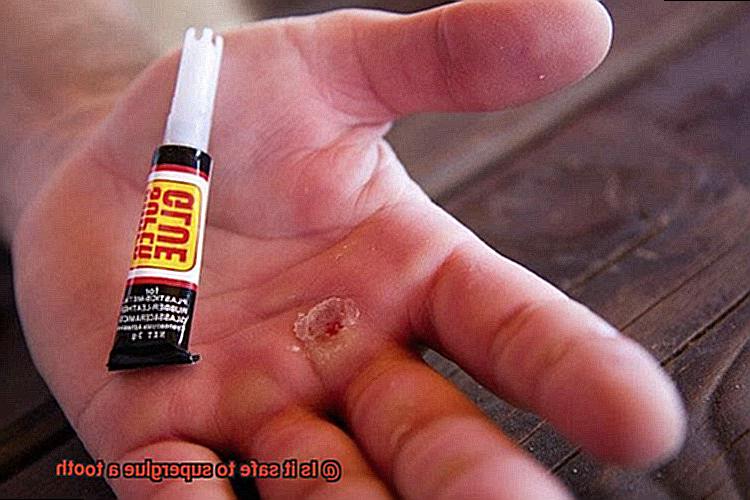
Preserving the knocked-out tooth is just the beginning. Now we need the experts. It’s crucial to seek immediate dental care after preserving the tooth. Time is running out, folks. The first hour after the incident is when reattachment is most likely to succeed. The dentist will assess the tooth’s condition and determine if reattachment is possible. Our tooth guardian angels are ready to save the day.
What to Expect During a Dental Appointment
Get ready for an exhilarating journey into the realm of dentistry, where your smile reigns supreme. From the moment you step foot into the dental office until you leave with a radiant grin, we’ll unveil every step of this thrilling adventure.
Checking In: Punctuality is Key.
Upon arrival at the dental office, punctuality is of utmost importance. Demonstrating respect for your dentist’s time ensures that everyone stays on schedule. You’ll be required to complete some forms regarding your medical history and insurance. Remember, providing accurate information empowers your dentist to make the best decisions for your oral health.
The Examination Room: Embrace Your Dental Sidekick.
A friendly dental assistant or hygienist will accompany you to the examination room. They’ll measure your blood pressure and inquire about any concerns you may have. Don’t hesitate to share any mouth-related issues that are bothering you—you’re in good hands.
The Dentist’s Close-Up: Embark on a Thorough Check-Up.
Now it’s time for the main event—the dentist’s examination. Armed with special tools like mirrors and probes, they’ll meticulously explore every nook and cranny of your smile. It’s like embarking on a mini-adventure, unraveling the mysteries hidden within your oral landscape.
X-Rays: Unmasking Hidden Secrets.
Behold the superhero in disguise—X-rays. These magical images enable dentists to uncover concealed problems such as cavities or jawbone issues. They reveal what the naked eye can’t perceive—it’s nothing short of extraordinary.
Treatment Time: Superheroes to the Rescue.
Based on the examination findings, your dentist will discuss any necessary treatments with you—ranging from fillings for cavities to deep cleanings for gum disease. They’ll provide a comprehensive explanation and answer any questions you may have. Remember, they’re here to be your oral health allies.
Oral Hygiene Tips: Unleash Your Inner Superhero.
Before bidding farewell, your dentist will equip you with oral hygiene instructions to become a superhero of your own smile. They’ll demonstrate proper brushing and flossing techniques, and may even recommend special toothpaste or mouthwash—your secret weapons for maintaining a dazzling smile.
Tips for Preventing Damage to Teeth
A dazzling smile has the power to captivate and radiate confidence. To preserve your pearly whites, it is crucial to prioritize good oral hygiene practices and make mindful choices regarding food and activities.
By implementing these simple tips into your daily routine, you can prevent damage to your teeth and maintain optimal oral health. Let’s delve into five essential sub-sections that will safeguard your smile.
Brush and floss regularly:
The cornerstone of dental care lies in regularly brushing your teeth at least twice a day and flossing them daily. This diligent routine eliminates plaque and bacteria, the culprits behind tooth decay and gum disease. Utilize a soft-bristled toothbrush and fluoride toothpaste to effectively cleanse every nook and cranny.
Be cautious with your diet:
Steer clear of hard and sticky foods that can lead to cracks or chips in your teeth. The temptation to chew on ice, nuts, or hard candies must be resisted as it can result in dental emergencies. Instead, opt for crunchy fruits and vegetables that promote oral health while satisfying your snack cravings.
Safeguard your teeth during physical activities:
For the active individuals who revel in sports or other physical pursuits, donning a mouthguard is non-negotiable. Mouthguards provide unparalleled cushioning and protection against facial blows, significantly reducing the risk of tooth fractures or loss. Prioritize safety without compromising your radiant smile.
Combat teeth grinding:
Bruxism, the act of grinding or clenching your teeth, poses a threat to dental well-being. This habit can cause tooth wear, jaw pain, headaches, and even fractures. If you suspect that you grind your teeth at night or experience related symptoms, consult with your dentist who can recommend a nightguard or other treatments to alleviate the issue.
Preserve your teeth by avoiding their misuse:
While it may be tempting to use your teeth as versatile tools, it is imperative to resist this urge. Opening bottle caps or tearing open packaging with your teeth exerts excessive pressure and heightens the risk of cracks or fractures. Remember, your teeth are meant for chewing, not for performing handyman tasks.
ihe71sBAYLY” >
Also Read: Should I glue my crown back on? – Glue Things
Conclusion
In conclusion, supergluing a tooth is not a safe or recommended solution.
While it may seem like a quick fix, it can lead to serious complications and further damage to the tooth and surrounding tissues. The strong adhesive properties of superglue can cause irritation, inflammation, and even toxic reactions in the mouth.
It’s crucial to seek professional dental care when faced with a broken or dislodged tooth to ensure the best possible outcome for your oral health.

